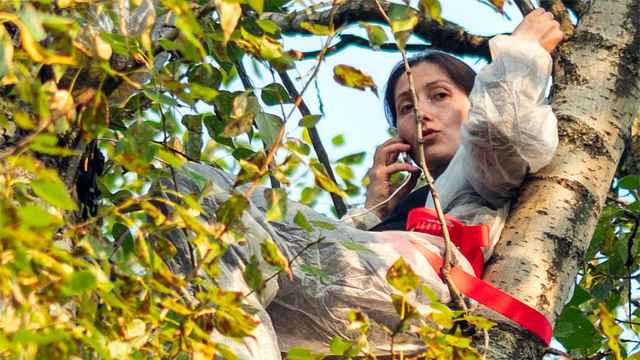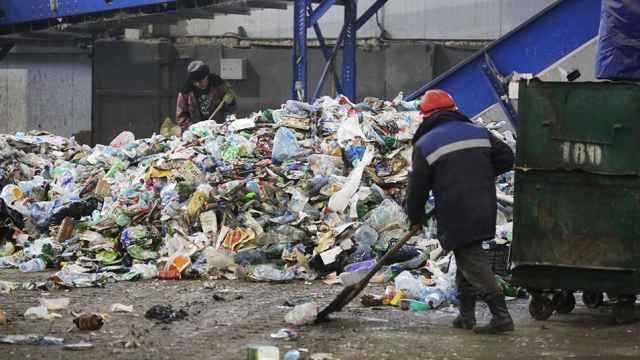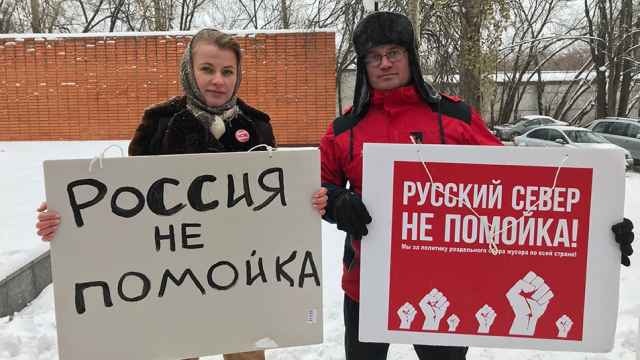When lawyer Olga Slastunina chose Troitsk as her new home back in 2006, the presence of the vast Troitsky Forest on her doorstep was one of the main draws.
This green expanse, which she describes as "an absolute marvel," created a special atmosphere in Troitsk, an academic town of 60,000 inhabitants that became a part of Moscow in 2012. But in recent years, just taking a stroll in the forest has become increasingly fraught.
"I remember that day vividly. We went out and said 'No' to loggers, and suddenly a group of people dressed entirely in black, with balaclavas covering their faces, ran toward us like a dark avalanche," Slastunina told The Moscow Times. "They started beating us."
Slastunina joined the Save Troitsky Forest initiative in 2010 when authorities unveiled plans to clear a sizeable chunk of the forest for development, sparking fierce resistance from the local community.
Since then, her life has been an everyday battle to protect the forest from clearing that violates multiple environmental laws and harms dozens of threatened species.
While construction in the forest could have started as early as 2011, a determined public and legal opposition managed to delay it for over a decade.
However, in January 2022, heavy machinery under the protection of Russia's National Guard (Rosgvardia) entered the forest and started clearing trees to make way for a "giant school," which is expected to enroll some 2,100 students and feature a swimming pool and planetarium.
It was then that tensions between activists and developers reached a boiling point.
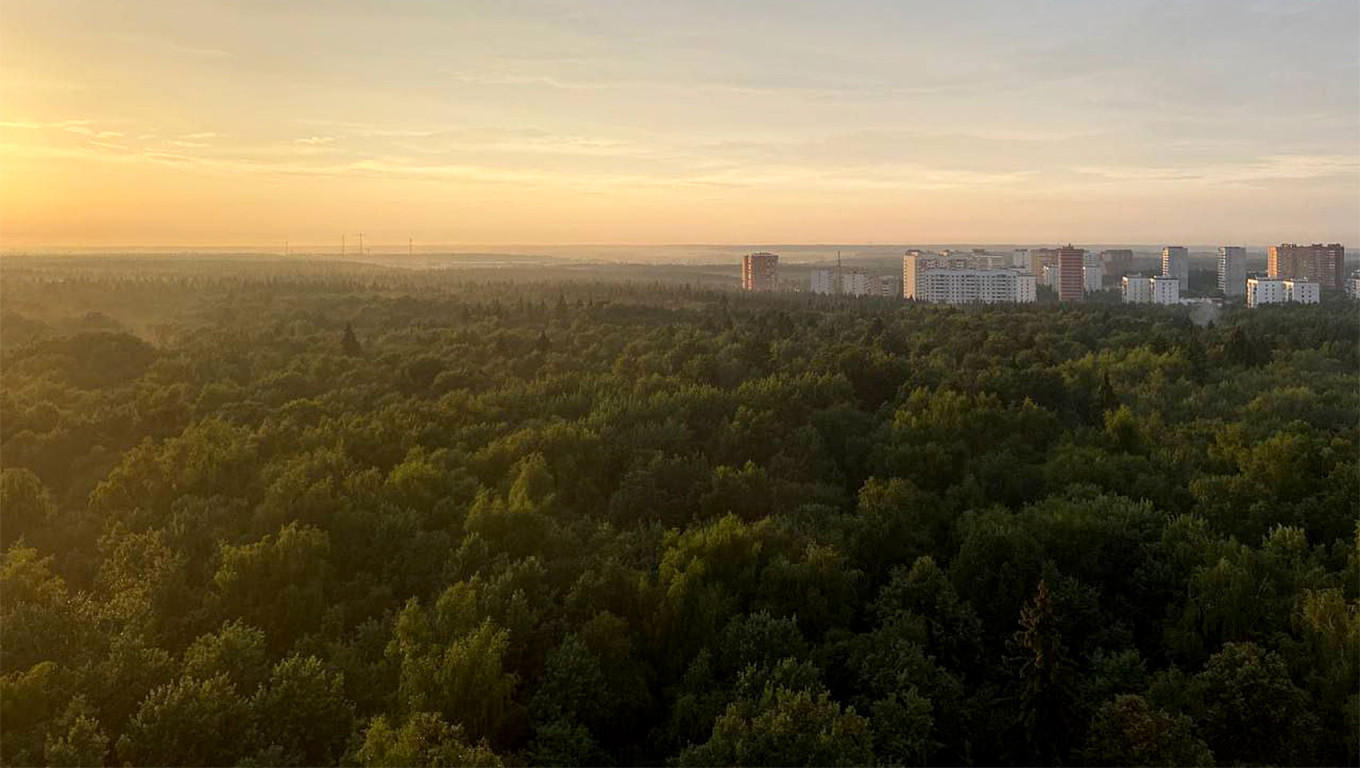
Slastunina recalled that residents visited the forest every day, obstructing the felling of centuries-old pines, spruces and oaks.
This led to "daily beatings" of forest defenders by people who were apparently brought in by the developers.
“Those individuals claimed that they were from a private military company and had participated in combat operations in Donbas, Syria and Georgia,” Slastunina said. “For us, this was absolutely shocking — a PMC had been unleashed on the residents of Troitsk.”
On another occasion, workers resorted to clearing the forest at night, but this did not help them go unnoticed by the locals.
"The entire forest was swarmed with migrant workers, and anyone who attempted to approach was immediately beaten, kicked in the head, and women were dragged through the snow by their hair,” Slastunina recalled.
“Buzzing chainsaws, falling trees, beatings and screams of the residents — such was the scene."
Ongoing and planned developments in city forests and parks, including in protected natural areas, have sparked grassroots resistance across greater Moscow in recent years.
Mayor Sergei Sobyanin is known for his efforts in transforming the Russian capital into a world-class urban paradise. In 2022, UN Habitat ranked Moscow first among 29 major global cities in terms of infrastructure development and quality of life.
Though concerns about opaque public money spending are regularly voiced, city officials claim that Moscow's budget is “socially focused,” with half of all funds allocated to social support programs, healthcare, education, culture and sports.
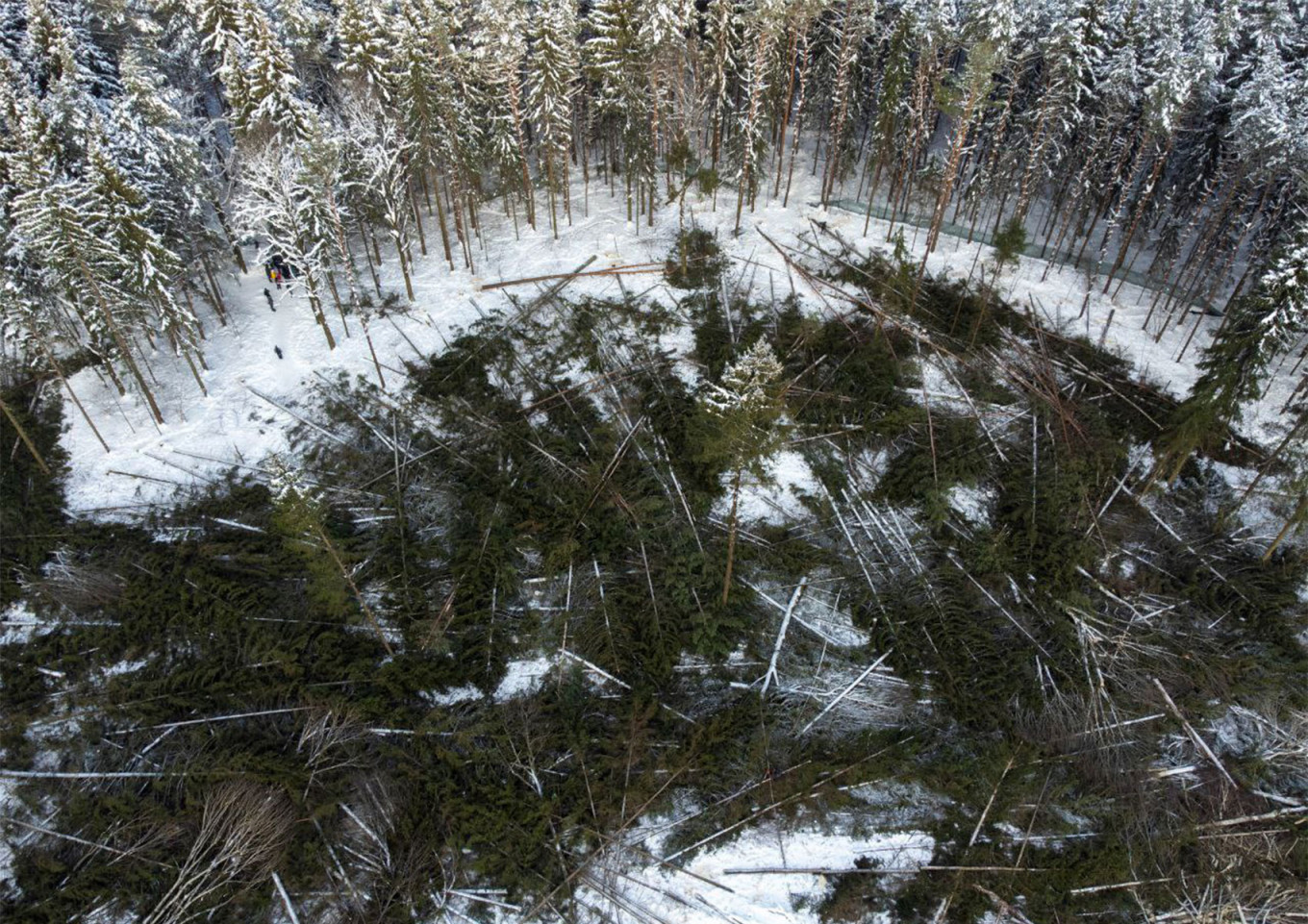
Along with other improvements, such as upgraded public transportation and renovated streets, the development of urban forests and parks is seen by some as part of the story of how Moscow has “gotten prettier” (pokhoroshevshaya, a meme known to many Muscovites) under Sobyanin’s tenure since 2010.
Over this period, the city has spent at least 300 billion rubles ($3.1 billion) solely on park “improvement” (blagoustroystvo, literally meaning “to arrange well”), the Proekt investigative outlet estimated in 2020.
Nearly 1,000 parks have been created or improved in the capital in recent years, Sobyanin said at the Moscow Urban Forum in August.
"The urban environment is a part of our lives. Therefore, our primary goal is to transform this chaos into well-organized comfort," Sobyanin said.
However, this blagoustroystvo comes at a cost to the environment, said Dmitry Morozov, coordinator of the Forest Coalition of Moscow, an association of over 30 grassroots groups.
“Streetlights frighten birds, sealing the soil in asphalt destroys the natural landscape, tree roots are damaged, and living nature gradually begins to die,” Morozov told The Moscow Times.
While new schools, bike lanes and sporting grounds improve the lives of some Muscovites, those who oppose this vision of convenient urban greenery may face beatings, harsh police detentions and potential criminal charges.
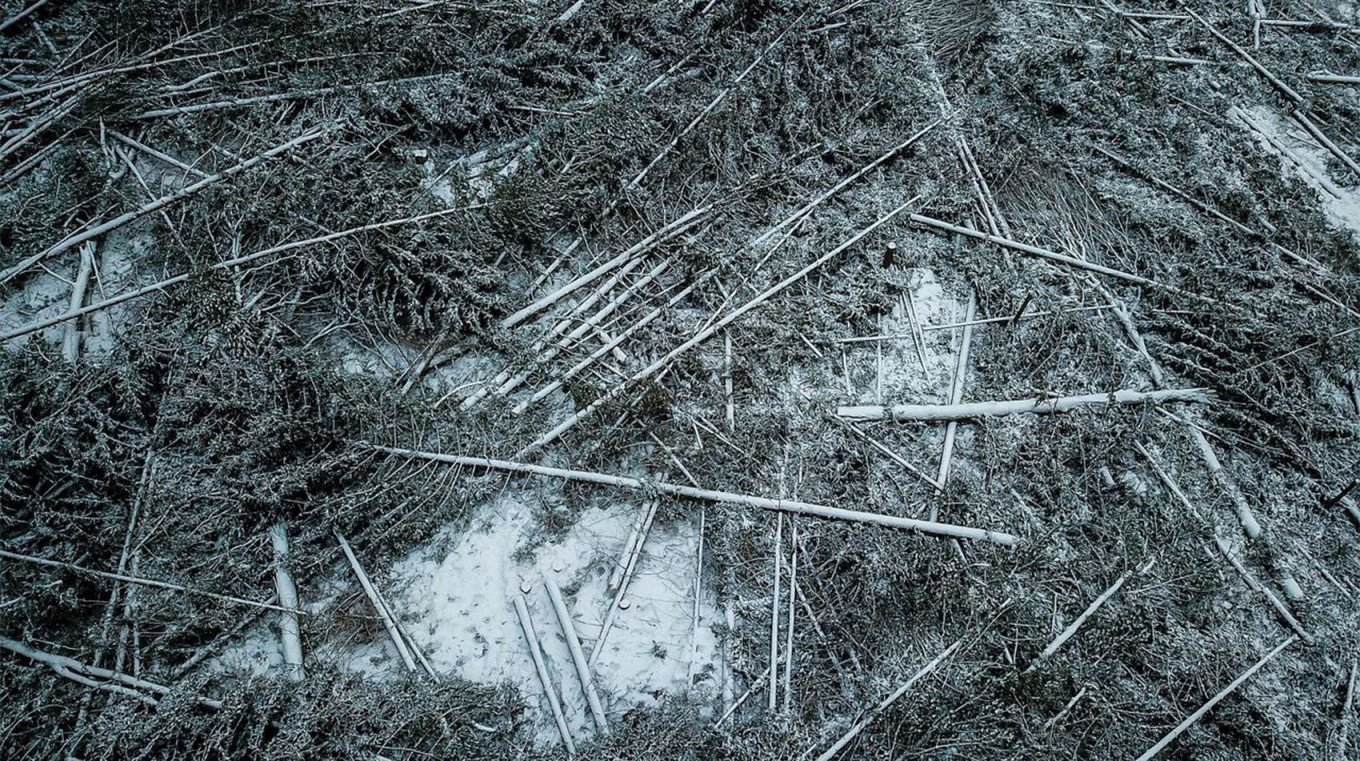
The violence in Troitsky Forest flared up again in January 2023. This time, Slastunina was taken into police custody and spent the night in a cold, dark cell. Many activists were then slapped with fines of up to 150,000 rubles ($1,500).
Despite the events in Troitsky Forest, demonstrating some of the most brutal examples of treatment toward local activists, there are other areas of concern, biologist and forestry expert Alexey Yaroshenko told The Moscow Times.
He pointed to the development of Losiny Ostrov (“Moose Island”), a national park that sits partially within Moscow's city limits and that is home to 800 plant and over 200 animal species.
Losiny Ostrov is unique among the Russian capital's 148 specially protected natural areas due to its federal-level protected status.
Yaroshenko described the current developments in the national park as “federal-level lawlessness,” mentioning a wide asphalt road that was recently built there on an old railway site.
“Formally, the road['s construction] has some justification, but in fact, it is not used for anything other than riding stand-up scooters. Perhaps this is not the main purpose of the natural area. It's just senseless vandalism."
The expert added that while some development projects in protected areas — such as hiking trails — are not strictly prohibited by law, the decision to pursue them should involve a diverse group of professionals in nature conservation, tourism, education, and urban planning, rather than a select few bureaucrats who are prone to make mistakes.
Today, a residential complex called Fairy Forest is being built near Losiny Ostrov’s borders, with recently enacted legislation enabling extensive landscaping, road construction and other infrastructure development, the Bereg journalists' cooperative reported.
City authorities refer to these activities as "a project for the rehabilitation of the national park."
"We have many parks and specially protected natural areas in Moscow that we carefully restore, preserving a comfortable habitat for animals and providing great recreational opportunities for Moscow residents," Sobyanin said in July.
Bitsevsky Forest, the capital’s second-largest natural park, also witnessed physical altercations this summer between forest defenders and unidentified individuals clad in black, as well as the destruction of endangered plants.
At the same time, forest areas in several locations were cleared this year for the installation of air defense systems, including near the UNESCO-listed Church of the Ascension site in Kolomenskoye, The Insider reported.
Despite this, the mayor and other city officials regularly hail Moscow as the “greenest megacity in the world,” citing a single international ranking.
This rating owes to the fact that Moscow absorbed new, much less developed territories in 2012, increasing its area 2.4 times, three experts in the field told The Moscow Times.
“They added a piece of forest that hadn't been cut down yet, and this kind of ensures the ecological balance,” an expert who requested anonymity to speak freely told The Moscow Times.
“If we take an honest look at it, one should calculate how much greenery there is per person in each part of the city. In Moscow, all residents of the city center are in areas with insufficient greenery.”
As Moscow's population continues to grow, primarily due to migration from the regions, the city's construction sector thrives, the expert said.
“Construction is a highly corruption-prone industry because capital investments are often low, while the profit margins are enormous. Government contracts are measured in billions [of rubles], therefore many people are feeding off this.”
Morozov said that if widespread violations during construction go unchecked, it suggests that large investments have been made and that they are somehow “covered up” by Sobyanin or his team.
Yaroshenko noted that, in the eyes of officials, urban development in Moscow often means building as much as possible at the expense of natural habitats.
"On one hand, by creating essential social facilities, [construction] improves the quality of life. But on the other hand, construction reduces it because of fewer green spaces. These aspects need to be balanced,” the expert noted.
So far, approximately nine hectares of the Troitsk Forest have been cleared. But activists have no intention of abandoning their fight to protect the forest, even as local residents grow increasingly demoralized.
"Unfortunately, this entire machine has been successful in its efforts to intimidate. But we continue [the resistance] unequivocally," Slastunina said.
A Message from The Moscow Times:
Dear readers,
We are facing unprecedented challenges. Russia's Prosecutor General's Office has designated The Moscow Times as an "undesirable" organization, criminalizing our work and putting our staff at risk of prosecution. This follows our earlier unjust labeling as a "foreign agent."
These actions are direct attempts to silence independent journalism in Russia. The authorities claim our work "discredits the decisions of the Russian leadership." We see things differently: we strive to provide accurate, unbiased reporting on Russia.
We, the journalists of The Moscow Times, refuse to be silenced. But to continue our work, we need your help.
Your support, no matter how small, makes a world of difference. If you can, please support us monthly starting from just $2. It's quick to set up, and every contribution makes a significant impact.
By supporting The Moscow Times, you're defending open, independent journalism in the face of repression. Thank you for standing with us.
Remind me later.




